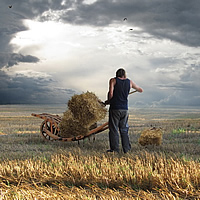Nikiko Masumoto offers a lovely essay on the idea of family farmer as performance artist. Given her dual background in a family of family farmers, and her education in gender studies and ‘performance as public practice,’ she seems uniquely suited to the comparison. She suggests that farming can be a performance, according to Elin Diamond’s definition of performance as ”embodied acts, in specific sites, witnessed by others… [and] …a thing done, the completed event.”
Farming produces something essential to the human experience — food — but also requires a full range of senses and sensibilities. To Masumoto, ”Picking grapes is an example of embodied farm knowledge, a dance in the fields; we pick by memory, observation, rhythm, desire.”
And when considered as artistic practice, or creative performance, farming evokes the deep relationship between farmer and land, and the farmer’s work to the experience of the (literal) consumer. Says Masumoto:
What we create on our farm is far more than ”product”—as we grow organic peaches, grapes, and nectarines, we worry about the embodied experiences of our will-be eaters. Our audience is always in our consciousness. We strive to grow nutritious food through ethical and sustainable methods that also result in pleasure. The moment of contact may not be visible—eaters rarely witness farm labor—yet the connection is there. Our daily performances on the farm result in an intimate audience experience: we can think of eating as embodied witnessing, albeit often nameless and unconscious. What we grow, what my hands cradle from the vine, becomes part of someone’s body.
There’s something intriguing about producing work that nourishes the body, both in partnership and in opposition to the forces surrounding you (weather, weeds, water, and such). Both for the artist and the farmer, the resulting work is both back-breaking and beautiful, and, in turns, more of the former than the latter.



A very unique way to look at farming. Thanks for sharing.